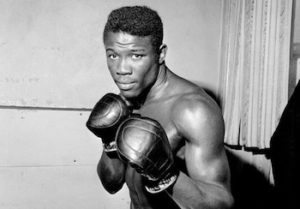
Emile Griffith
*Emile Griffith was born on this date in 1938. He was an Afro Caribean professional boxer.
From St. Thomas, the Virgin Islands, he worked as a stock boy handling women's hats at a New York garment factory when factory executive and boxing manager Howie Albert noticed his physique and coaxed him to work out for famed boxing trainer Gil Clancy. Griffith was a fast-punching, deceptive fighter whose personal joy shone through even in tough match-ups such as a 1965 venture into the home arena of Fresno's Gabe Terronez, a bout Griffith won easily by fourth-round knockout. But the boxer found a foil in Cuba's Benny "Kid" Paret.
Griffith knocked out Paret in the 13th round of their April 1961 bout, and Paret responded with a split-decision triumph five months later. That set the stage for their third bout at Madison Square Garden in March 1962, when Paret inflamed Griffith by insulting him with a slur, which Sports Illustrated described as "gutter Spanish for homosexual." Clancy had to take Griffith for a walk around New York following the weigh-in to help him cool off. Griffith told Ross: "There was never hatred, but I was very angry."
In the 1962 Sports Illustrated account, Gilbert Rogin wrote: "It is the most vulgar epithet in that violent idiom and is particularly galling to Griffith, who has a piping voice, wears extravagantly tight clothes, has designed women's hats and is, ordinarily, a charming, affectionate kid." Griffith told Ross he meant to win the fight by knockout, "but I never intended to harm Benny Paret." Griffith controlled the fight before Paret scored a quick knockdown in the eighth round. Griffith rallied and cornered Paret in the 12th. Sports Illustrated reported: "Suddenly, Emile battered Paret with a thundering right. This time, Griffith resolved to finish him.
He began belaboring the suffering Paret with right uppercuts, one after another, an unrelenting barrage, Griffith's hand banging against Benny's jaw as remorselessly as the clapper of a great, dark bell. Paret sagged back against the middle turnbuckle. Griffith's punches drove his head out between the top and middle strands. "Benny was helpless, bleeding from his nose and a cut on his right cheek; his puffed eyes were closed," Sports Illustrated reported. "Still, Griffith punched him with mounting and maniacal rage as though determined to wipe out Paret and the memory of his taunt. There were, in all, about 15 uppercuts, followed by several hooks." Griffith said later: "When I saw Paret hurt, I wanted him to be on the ground before the fight was stopped. I wanted to keep punching. I was still eager to put him down." Referee Ruby Goldstein finally stopped the fight. Paret died ten days later.
Emile Griffith, a former world welterweight and middleweight boxing champion who spent decades haunted by his fatal beating of then-champion Benny Paret in the ring and bothered by the public's interest in his sexuality, died on July 23, 2013. He was 75. The International Boxing Hall of Fame announced Griffith’s death at an extended-care facility in Hempstead, N.Y., where he was inducted in 1990 following an 85-24-2 career that counted 23 main events at Madison Square Garden and victories over middleweight champions Dick Tiger and Nino Benvenuti.
Regarding Gay athletes, though Griffith had been bedridden, limited to tube feeding since 2011, the time has been marked by the prominent disclosures of two athletes, boxer Orlando Cruz and former NBA player Jason Collins, that they are gay. In recent months, Cruz, preparing for an Oct. 12 world featherweight title fight, attempted to schedule a meeting with Griffith that never happened. "Emile would be very pleased and accepting of these athletes," Ross said. "He had his own set of rules for life, and he felt people could live their lives how they wanted." "He was a man's man in the world of boxing but his person out in the world," said Griffith's friend and biographer, Ron Ross, whose book on the fighter, "Nine… Ten… and Out! The Two Worlds of Emile Griffith," was published in 2008. "It was difficult to get into details with Emile. To the end, he would not want to make himself so open to everyone," Ross said. "He didn't like to be labeled gay and still felt the world was not ready for Emile Griffith."
